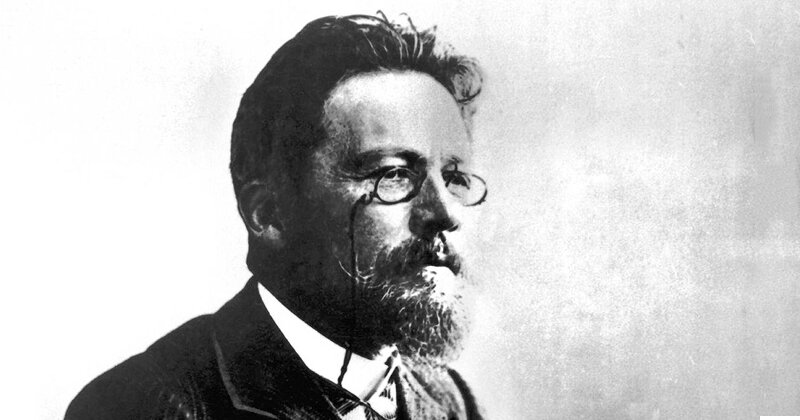What Chekhov Knew About Sitcoms
His heyday was long before the advent of prime time comedy but I often paraphrase Anton Chekhov whenever an aspiring screenwriter suddenly throws a contrivance into the third act that had nary a passing reference in the first or second.
The objective is always the same: to try to jumpstart a floundering plot with a last-ditch surprise in order to keep it from dribbling off with a whimper. What’s interesting is the correlation to TV series that—when faced with a waning (or yawning) audience—will do virtually anything to stay on the air.
For this month’s lesson plans, your assignment is to write a synopsis, a treatment or a three-page scene inspired by each of the Chekhov quotes.
“ANY IDIOT CAN FACE A CRISIS - IT'S DAY TO DAY LIVING THAT WEARS YOU OUT.”
There are three major differences between crafting a plot for the movies and coming up with a premise for a TV show.
1. A movie is a stand-alone product that needs to deliver an entire story in the space of 120 minutes or less. In contrast, a TV series is a succession of weekly installments that—if the ratings are good—can unfold over the course of many seasons. As is often quipped about M*A*S*H, for instance, the series actually lasted eight years longer than the Korean War it was depicting.
2. Movie characters are forced to take actions predicated on reward, revenge or escape in response to a major external conflict that has placed their lives and/or hearts in jeopardy. This meets the criteria of a character-driven tableau in which it’s the players themselves who push the storyline forward to resolution and, in doing so, experience emotional growth. In contrast, TV sitcoms are plot-driven wherein random acts of minor weirdness keep occurring that everyone predictably reacts to on the basis of their internal angst. Accordingly, they never evolve past whatever traits they projected when we first met them in the pilot episode. The exception? Finally declaring their feelings for the person we’ve known they should be with from the very beginning.
3. Protagonists in a film often have bigger-than-life jobs that the rest of us wistfully envy. They’re archaeologists, scientists, adventurers, spies, pirates, astronauts, etc. Look at the career paths of TV sitcom characters. What makes them relatable is that they’re engaged in the same mundane activities as their viewers; they’re waiters, government drones, teachers, servants and political lackeys. (On the plus side, however, the majority live in New York apartments that are larger than any flats inhabited by heroes on the silver screen or, for that matter, anyone who actually lives in New York.) Since there are only so many workaday scenarios that can revolve around ordinary people, the chances for them to shine are limited. You can always tell a sitcom is sliding when its main players suddenly take a trip to Hawaii, Europe, or go on a cruise; it’s their day-to-day living that has driven them – and us – to the brink of boredom.
“LOVE, FRIENDSHIP AND RESPECT DO NOT UNITE PEOPLE AS MUCH AS A COMMON HATRED FOR SOMETHING.”
In the first ten minutes of a movie, something happens that changes the status quo. It’s a disruption in harmony that forces the hero or heroine to do whatever it takes to restore order to their universe whether they have to wage a solo fight or recruit allies. In other words, whether it’s about payback time for a rotten boss (9 to 5) or matchmaking for a widowed dad (Sleepless in Seattle), we know from the get-go what the end-game is and that we only have two hours to reach it.
Sitcoms are more ambiguous. For one thing, the goal posts keep moving in order to sustain viewer interest. If the reason we’re watching the show is to see if the chemistry between the two leads is going to ignite, they need to keep questioning—and fighting—their attraction for as long as possible. Secondly, there’s rarely an inciting incident in a sitcom that sends the characters into the immediate pursuit of a quest to right a wrong or change their lifestyle. Stuff happens to them but it’s never stuff that—if the characters do absolutely nothing—will result in a dire outcome.
The unity of a sitcom’s ensemble cast often calls for everyone to agree on one thing even if they’re always at odds with each other; specifically, a circumstance or individual they can all comfortably hate. The easiest of these is an office setting with a bad boss. In family comedies, the suburban villain is usually an annoying relative or an intrusive neighbor. And in Seinfeld, there’s a single word that says it best: Newman.
“THERE IS NOTHING NEW IN ART EXCEPT TALENT.”
Listen closely to a film score by John Williams, James Horner or Michael Kamen and you can hear the influences that musicians of earlier centuries had on their respective styles. Even your fave bands or pop vocalists are probably “borrowing” elements that resonate with their style. Likewise, the plot devices of any movie you’ve ever seen can trace its origins to a quartet of core sources: fairy tales, mythology, the Bible, and Shakespeare.
TV sitcoms can trace their roots as well to a host of more recent ancestors that include I Love Lucy, Leave It To Beaver, Father Knows Best, The Adventures of Ozzie and Harriet, The Mary Tyler Moore Show, The Dick Van Dyke Show, My Three Sons, Laverne and Shirley, The Courtship of Eddie’ Father, My Favorite Martian, and Happy Days. What we see in prime time comedy today is little more than a combination of plot tweaks from pre-existing shows plus updates to reflect American society’s evolution insofar as shifts in moral behavior, the empowerment of women, politics, social issues, etc.
“IF YOU ARE AFRAID OF LONELINESS, DO NOT MARRY.”
One of the great appeals of movies and television is the ability to transport us to a world of fantasy where all things are possible, especially in the realm of romance. While movies can carry us for two hours through the adventures of larger-than-life personas, the intimacy of a TV screen brings familiar faces into our living room every week and invites us to vicariously follow their attempts to find True Love.
One of the fallacies of this fictional dynamic, however, is the same one that exists whenever a long-time friend who has been single practically forever suddenly finds Mr. Right. Overnight, it seems, she is no longer available to spend hours on the phone with you, watch weepy chick flicks over copious amounts of Dove bars and popcorn, or even be sympathetic to the woes of your own love life. By finding happiness and grabbing it with both hands, she no longer has time to relate to you, The Unattached.
How many feature films have you seen that actually culminate in a full-scale wedding? It’s implied that the lovers will tie the knot and live happily ever after but they generally leave us with the optimism that we won’t be completely divorced from their lives. A sitcom, however, requires us to invest so much time watching everything come together that once the besotted pair is finally on the journey to a very special “I do” episode, the rest of us are pretty much dumped on the side of the road with nothing left to fantasize about.
"ONE MUST NOT PUT A LOADED RIFLE ON THE STAGE IF NO ONE IS THINKING OF FIRING IT."
This quote most often attributed to Chekhov has also been subject to the most debate regarding interpretation. Was it meant to encourage economical brevity by removing any superfluous items that have no bearing on the plot? Or was it meant to remind writers to use foreshadowing as a device to tie the opening and closing acts together and elicit cheers when an audience connects the virtual dots?
While both views can be applied to the development of movies and sitcoms, there’s a third door which speaks to the issue of consistency. Translated: Whatever parameters you define at the beginning (especially including romantic tension) will be expected by the audience to be maintained throughout the storyline whether it runs for two hours or for ten years.
If you cast an adult in a TV series, there’s a good bet that—save for occasional experimentation with hairstyles and clothes—his/her looks aren’t going to change that much. Their fictional personas can age in real time just like the rest of us and no one really notices that it’s happening. Babies, teens and tweens, however, age in dog years. Those growth spurts during a production’s summer hiatus can take them from crib to kindergarten by the start of the second season and suddenly require the use of twins to accommodate child labor laws.
While everyone has to grow up sometime, it can be the kiss of death to a sitcom whose primary viewers were only watching because they liked the precocious kid or the funny dog. The solution? As soon as the “baby” in the family starts to outgrow its usefulness to the fan base, a replacement needs to be brought in to fill the void.
Meet the Author, Christina Hamlett
Former actress/director Christina Hamlett is an award winning author, professional script consultant, and ghostwriter. Her credits to date include 42 books, 175 plays for young actors, and 5 optioned feature films.
She is committed to supplying great lesson plans for today’s classrooms. For feedback or topics for future columns, email authorhamlett@cs.com.





